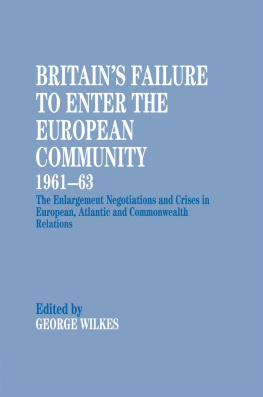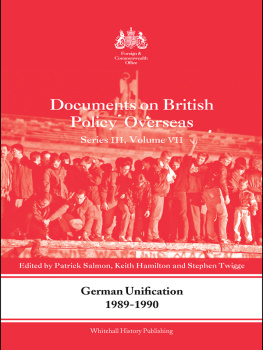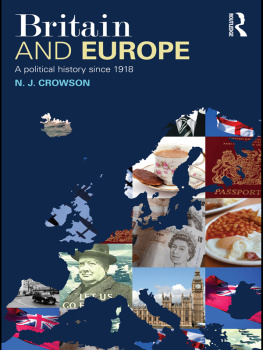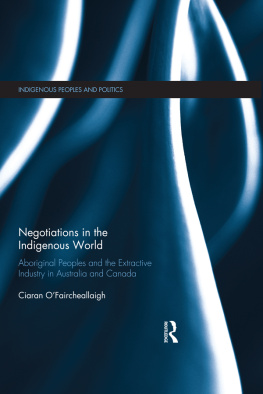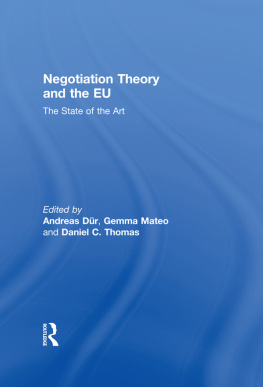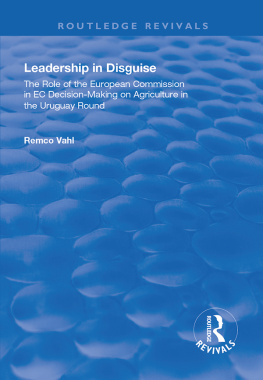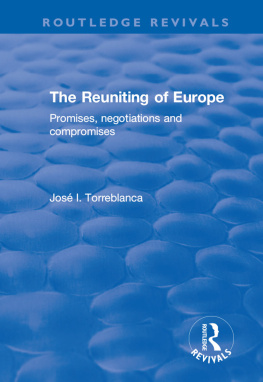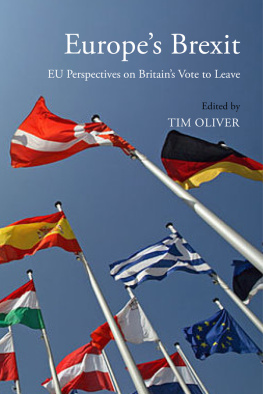BRITAIN'S FAILURE
TO ENTER THE EUROPEAN COMMUNITY
1961-63
BRITAIN'S FAILURE TO ENTER THE EUROPEAN COMMUNITY 196163
The enlargement negotiations and crises in European, Atlantic and Commonwealth relations
Edited by
GEORGE WILKES
First Published in 1997 in Great Britain by
Routledge
2 Park Square, Milton Park, Abingdon, Oxon, OX14 4RN
270 Madison Ave, New York NY 10016
Transferred to Digital Printing 2007
Copyright 1997 Contributors
British Library Cataloguing in Publication Data:
Britain's failure to enter the European Community, 196163:
the enlargement negotiations and crises in European, Atlantic and Commonwealth relations
1. European Economic Community countries - Foreign relations - Great Britain 2. Great Britain - Foreign relations European Economic Community countries - 1945
I. Wilkes, George
327.4'1'04'09046
ISBN 0-7146-4687-3 (cloth)
ISBN 0-7146-4221-5 (paperback)
Library of Congress Cataloging-in-Publication Data:
A catalog record for this book is available
from the Library of Congress
All rights reserved. No part of this publication may be reproduced in any form or by any means, electronic, mechanical, photocopying, recording or otherwise, without the prior permission of Routledge and Company Limited.
Publisher's Note
The publisher has gone to great lengths to ensure the quality of this reprint but points out that some imperfections in the original may be apparent
Contents
Acknowledgements
|
Notes on Contributors
|
List of Abbreviations
|
The first failure to steer Britain into the European Communities:
an introduction by George Wilkes
|
PART I THE KEY ACTORS AT BRUSSELS
|
A slow one hundred and eighty degree turn:
British policy towards the Common Market, 1955-60
Richard Griffiths
|
De Gaulle and the British 'application' to join the
Common Market
Maurice Va'sse
|
'Master-minding' a new Western Europe: the key
actors at Brussels in the superpower conflict
Gustav Schmidt
|
PART II OVERCOMING BRITAIN'S PROBLEMS
|
Anglo-Commonwealth relations and EEC membership:
the problem of the old Dominions
Stuart Ward
|
British agriculture and the Brussels negotiations:
a problem of trust
N. Piers Ludlow
|
Karl Newman, CB
|
PART III THE BREAKDOWN AND EUROPEAN UNITY
|
The Fouchet negotiations for political union and the
British application
Pierre Gerbet
|
Small state on the sidelines: Denmark and the question
of European political integration
Hans Branner
|
American 'Europeanists', Monnet's Action Committee
and British membership
Pascaline Winand
|
Oliver Bange
|
George Wilkes
|
Chronology
|
Select bibliography
|
This book would not have been possible without the generous support of all those who sponsored the 'Brussels Breakdown conference' in Cambridge in July 1993: Richard Langhorne and the Centre for International Studies, Cambridge University; the Bernard Sunley Charitable Foundation, and in particular, Sir William Shapland; the European University Institute, particularly the then President, Emile Nol, the Governing Body and Professor Richard T. Griffiths, at that time Professor of History and Civilization; the Franco-British Council, and in particular its Director, Sarah Chapman; the Goethe-Institut London; the British Academy; and St John's College, Cambridge.
In the editing of this book, I have been fortunate to have had constant resource to the advice and encouragement of my supervisor, Geoffrey Edwards, and from my family, for which I am extremely grateful. David Michaels and Robert Easton of Frank Cass Publishers have been most helpful editors. I would also like to thank Oliver Bange, Piers Ludlow, Stuart Ward, Peter Stirk and David Weigall for the help they provided at various times, as well as Melissa Percival for assisting with translations.
I would finally like to thank the contributors to this book, especially those eye-witnesses who have contributed their personal memories of the events covered in the book, listed at the end of Chapter 12.
GEORGE WILKES Cambridge
Oliver Bange completed his doctorate last year at the London School of Economics, entitled 'Picking up the Pieces - Schrder's Working Programme for the European Communities and the Solution of the 1963 Crisis'.
Hans Branner lectures at the Institute for Political Science of the University of Copenhagen. His articles in English include 'Danish European Policy Since 1945: The Question of Sovereignty', in M. Kelstrup, ed., European Integration and Denmark's Participation (Copenhagen: Copenhagen Political Studies Press, 1992), and 'Denmark and the ECSC, 1950-53', in T.B. Olesen, ed., Denmark, Scandinavia and European Integration: 1945-1960 (Odense: Odense Universitetsforlag, 1996).
Professor Pierre Gerbet , Institut d'Etudes Politiques, Paris, is the author of the standard academic works on plans for political union among the members of the European Communities, most notably La construction de l'Europe (Paris: Plon, 1983), and on French foreign policy, including Le relvement, 1944-49 (Paris: Imprimerie nationale, 1993).
Professor Richard Griffiths is Professor of Economic and Social History at the University of Leiden, having been until 1995 Professor of History and Civilization at the European University Institute in Florence. He has edited and contributed to numerous works on political and economic aspects of the history of post-war European integration, including The Netherlands and the Integration of Europe, 1947-57 (Amsterdam: NEHA, 1990) and Socialist Parties and the Question of Europe in the 1950s (Leiden/New York: E.J. Brill, 1993).
Dr N. Piers Ludlow is a Fellow of Balliol College, Oxford. In 1995 he completed his doctorate on 'A Failed Enlargement: The Six and the First British Application to the EEC, 1961-1963' (unpublished thesis, Oxford, 1995).
Karl Newman , CB, is an international lawyer, formerly of the Lord Chancellor's Office, secretary to the official committee charged with examining the legal implications of entry into the Common Market.
Professor Gustav Schmidt holds the Chair of International Politics at the Ruhr-Universitt, Bochum. His latest work is an edited volume, Zwischen Bndnissicherung und privilegierter Partnerschaft: Die deutsch-britischen Beziehungen und die Vereinigten Staaten von Amerika, 1955-1963 (Bochum: Universittsverlag Dr N. Brockmeyer, 1995).
Professor Maurice Vasse is Director of the Centre d'tudes d'histoire de la Dfense in the French Defence Ministry, and a Fellow of the Institut d'histoire des relations internationales contemporaines and of the Institut Charles de Gaulle. He is the editor of L'Europe et la Crise de Cuba (Paris: Armand Colin, 1993) and La France et l'atome (Brussels: Bruylant, 1995).
Stuart Ward is completing his doctorate on Australian policy towards the negotiations for British membership of the EC at the European University Institute and the University of Sydney. He has co-edited with Richard Griffiths Courting the Common Market: The first attempt to enlarge the European Community, 1961-63 (London: Lothian Press, 1995).

